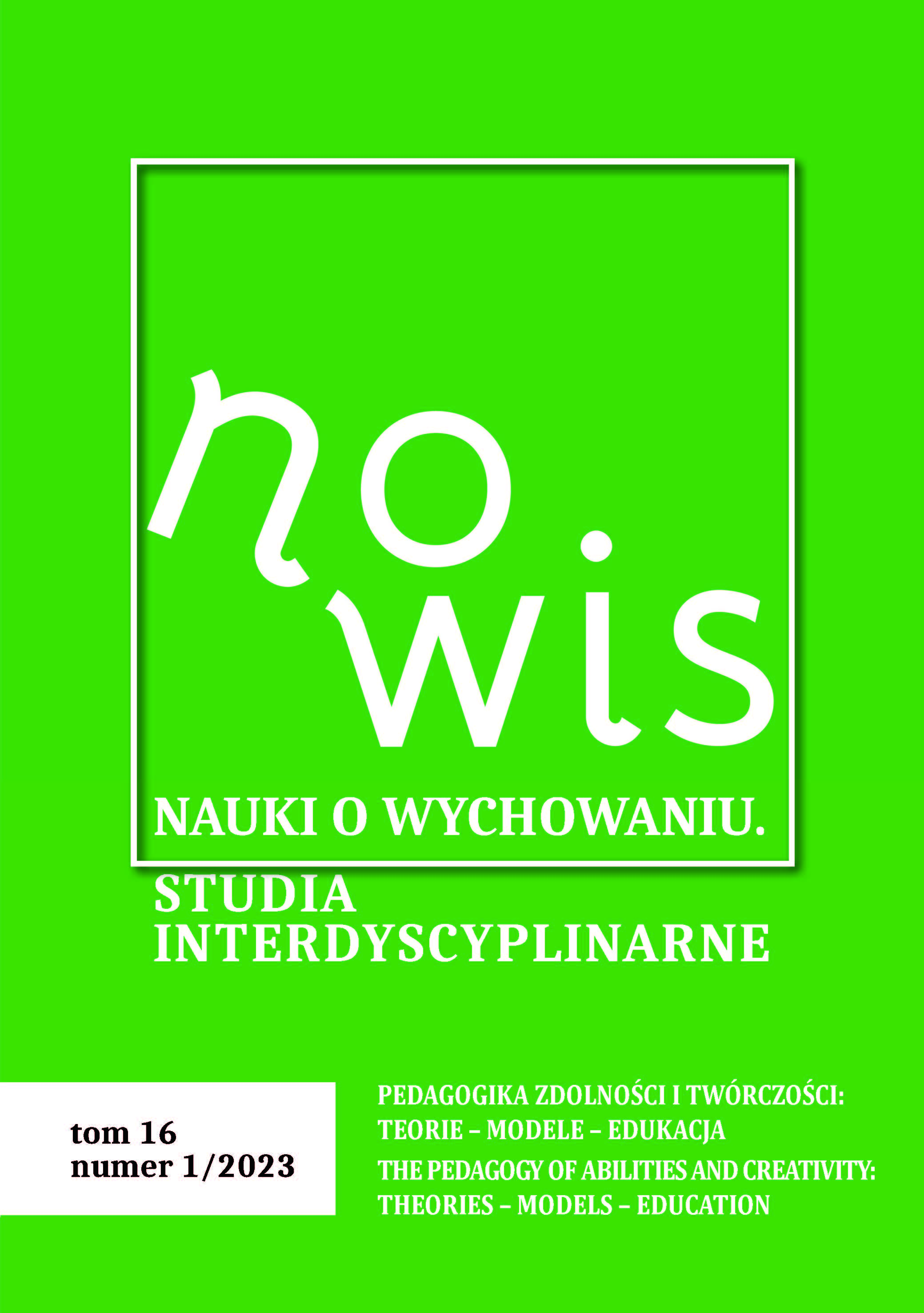Czynniki wpływające na rozwój talentu sportowego w opinii trenerek gimnastyki artystycznej
DOI:
https://doi.org/10.18778/2450-4491.16.07Słowa kluczowe:
talent sportowy, rozwój talentu, gimnastyka artystyczna, trenerzyAbstrakt
Celem badań było poznanie opinii trenerek gimnastyki artystycznej na temat czynników wpływających na rozwój talentu sportowego. W badaniach z udziałem 30 trenerek wykorzystano ankietę demograficzną, pytania otwarte (wywiad ustrukturyzowany) oraz polską wersję Kwestionariusza Środowiska Rozwoju Talentów (TDEQ PL). W analizie wyników zastosowano strategie mieszane (ilościowe i jakościowe). Badanie ujawniło dwa rodzaje facylitatorów (niezbędne oraz sprzyjające) i dwa rodzaje inhibitorów (uniemożliwiające oraz zakłócające). W ramach czynników niezbędnych trenerki wskazywały najczęściej długoterminową motywację. Wsparcie społeczne było postrzegane jako główny czynnik sprzyjający rozwojowi talentów. Nieodpowiednie podejście dziecka do treningów oraz nieodpowiednie zaangażowanie rodziców zostały wskazane jako główne czynniki uniemożliwiające rozwój talentu. Sytuacje trudne (np. problemy zdrowotne) zostały wymienione jako główny czynnik zakłócający. Trenerki uznały zindywidualizowane podejście do zawodnika za najważniejszy czynnik środowiskowy, który pozytywnie wpływa na rozwój utalentowanych gimnastyczek artystycznych.
Bibliografia
Bloom B. S. (1985) Generalizations About Talent Development in: B. S. Bloom (ed.), Developing Talent in Young People, New York, Ballantine, pp. 507–549.
Google Scholar
Bridge M., Toms M. (2013) The Specializing or Sampling Debate: A Retrospective Analysis of Adolescent Sports Participation in the UK, “Journal of Sports Sciences”, no. 31(1), pp. 87–96, https://doi.org/10.1080/02640414.2012.721560
Google Scholar
DOI: https://doi.org/10.1080/02640414.2012.721560
Capranica L., Millard-Stafford M. L. (2011) Youth Sport Specialization: How to Manage Competition and Training?, “International Journal of Sports Physiology and Performance”, no. 6(4), pp. 572–579, https://doi.org/10.1123/ijspp.6.4.572
Google Scholar
DOI: https://doi.org/10.1123/ijspp.6.4.572
Côté J., Baker J., Abernethy B. (2003) From Play to Practice: A Developmental Framework forthe Acquisition of Expertise in Team Sport in: J. Starkes, K. A. Ericsson (eds.), Expert Performance in Sports: Advances in Research on Sport Expertise, Champaign, IL, Human Kinetics, pp. 89–113, https://doi.org/10.5040/9781492596257.ch-004
Google Scholar
DOI: https://doi.org/10.5040/9781492596257.ch-004
Côté J., Fraser-Thomas J. (2008) Play, Practice, and Athlete Development. (Coach’s Corner Eddie Jones, Coaching Consultant, Saracens Rugby Club) in: D. Farrow, J. Baker, C. MacMahon (eds.), Developing Sport Expertise: Researchers and Coaches Put Theory into Practice, London–New York, Taylor & Francis Group, pp. 15–28.
Google Scholar
Côté J., Lidor R., Hackfort D. (2009) ISSP Position Stand: To Sample Or To Specialize? Seven Postulates About Youth Sport Activities That Lead To Continued Participation And Elite Performance, “International Journal of Sport and Exercise Psychology”, no. 9, pp. 7–17, https://doi.org/10.1080/1612197X.2009.9671889
Google Scholar
DOI: https://doi.org/10.1080/1612197X.2009.9671889
Dohme L.-C., Piggott D., Backhouse S., Morgan G. (2019) Psychological Skills and Characteristics Faciltative of Youth Athletes’ Development: A Systematic Review, “The Sport Psychologist”, no. 33(4), pp. 261–275, https://doi.org/10.1123/tsp.2018-0014
Google Scholar
DOI: https://doi.org/10.1123/tsp.2018-0014
Elferink-Gemser M. T., Jordet G., Coelho-E-Silva M. J., Visscher C. (2011) The Marvels of Elite Sports: How to Get There?, “British Journal of Sports Medicine”, no. 45(9), pp. 683–684, https://doi.org/10.1136/bjsports-2011-090254
Google Scholar
DOI: https://doi.org/10.1136/bjsports-2011-090254
Farrow D., Baker J., MacMahon C. (2008) Developing Sport Expertise: Researchers and Coaches Put Theory into Practice, London–New York, Taylor & Francis Group, https://doi.org/10.4324/9780203934937
Google Scholar
DOI: https://doi.org/10.4324/9780203934937
Gagné F. (2016) Od genów do talentu: z perspektywy modeli DMGT/CMTD, trans. A. zewczuk, „Psychologia Wychowawcza”, no. 51(9), pp. 121–140, https://doi.org/10.5604/00332860.1211501
Google Scholar
DOI: https://doi.org/10.5604/00332860.1211501
Gibbs G. (2008) Analyzing Qualitative Data, Los Angeles, Sage Publications Ltd., https://doi.org/10.4135/9781849208574
Google Scholar
DOI: https://doi.org/10.4135/9781849208574
Gould D. Dieffenbach K., Moffett A. (2002) Psychological Characteristics and Their Development in Olympic Champions, “Journal of Applied Sport Psychology”, no. 14, pp. 172–204, https://doi.org/10.1080/10413200290103482
Google Scholar
DOI: https://doi.org/10.1080/10413200290103482
Gulbin J., Oldenziel K. E., Weissensteiner J. R., Gagné F. (2010) A Look Through the Rear View Mirror: Developmental Experiences and Insights of High Performance Athletes, “Talent Development and Excellence”, no. 2(2), pp. 149–164.
Google Scholar
Kocowski T. (1978) Potrzeby człowieka – koncepcja systemowa, Wrocław, Wydawnictwo Politechniki Wrocławskiej.
Google Scholar
Law M., Côté, J., Ericsson K. A. (2007) Characteristics of Expert Development in Rhythmic Gymnastics: A Retrospective Study, “International Journal of Sport and Exercise Psychology”, no. 5, pp. 82–103, https://doi.org/10.1080/1612197X.2008.9671814
Google Scholar
DOI: https://doi.org/10.1080/1612197X.2008.9671814
Martindale R. J. J., Collins D. A., Abraham A. (2007) Effective Talent Development: The Elite Coach Perspective in UK Sport, “Journal of Applied Sport Psychology”, no. 19, pp. 187–206, https://doi.org/10.1080/10413200701188944
Google Scholar
DOI: https://doi.org/10.1080/10413200701188944
Martindale R. J. J., Collins D. A, Daubney J. (2005) Talent Development: A Guide for Practice and Research Within Sport, “Quest”, no. 57, pp. 353–375, https://doi.org/10.1080/00336297.2005.10491862
Google Scholar
DOI: https://doi.org/10.1080/00336297.2005.10491862
Martindale R. J. J., Collins D., Wang J. C. K., McNeill M., Lee K. S., Sproule J., Westbury T. (2010) Development of the Talent Development Environment Questionnaire for Sport, “Journal of Sports Sciences”, no. 28(11), pp. 1209–1221, https://doi.org/10.1080/02640414.2010.495993
Google Scholar
DOI: https://doi.org/10.1080/02640414.2010.495993
Myer G. D., Jayanthi N., DiFiori J., Faigenbaum A. D., Kiefer A., Logerstedt D., Micheli L. (2015) Sports Specialization, Part I: Does Early Sport Specialization Increase Negative Outcomes and Reduce the Opportunity for Success in Young Athletes?, “Sports Health”, no. 7(5), pp. 37–442, https://doi.org/10.1177/1941738115598747
Google Scholar
DOI: https://doi.org/10.1177/1941738115598747
Myer G. D., Jayanthi N., DiFiori J., Faigenbaum A. D., Kiefer A., Logerstedt D., Micheli L. (2016) Sports Specialization, Part II: Alternative Solutions to Early Sport Specialization in Youth Athletes, “Sports Health”, no. 8(1), pp. 65–73, https://doi.org/10.1177/1941738115614811
Google Scholar
DOI: https://doi.org/10.1177/1941738115614811
Polski Związek Gimnastyczny PZG (2017) Wieloletni program szkolenia w sportach gimnastycznych dla oddziałów i szkół sportowych oraz oddziałów i szkół mistrzostwa sportowego, Warszawa.
Google Scholar
Siekańska M. (2012a) Athletes’ Perception of Parental Support and Its Influence on Sports Accomplishments – a Retrospective Study, “Human Movement”, no. 13(4), pp. 380–38, https://doi.org/10.2478/v10038-012-0046-x
Google Scholar
DOI: https://doi.org/10.2478/v10038-012-0046-x
Siekańska M. (2012b) Jak wspierać by nie wywierać presji? Zachowania rodziców wobec dzieci uprawiających sport wyczynowo in: J. Blecharz, M. Siekańska, A. Tokarz (eds.) Optymalizacja treningu sportowego i zdrowotnego z perspektywy psychologii. Praktyczna Psychologia Sportu, pp. 317–332, Kraków, Wydawnictwo AWF.
Google Scholar
Siekańska M. (2013) Talent sportowy. Psychologiczne i środowiskowe uwarunkowania rozwoju uzdolnionych zawodników, Kraków, Wydawnictwo AWF.
Google Scholar
Siekańska M., Wojtowicz A. (2017) Polish Version of Research Based Model of Sport Talent Development Environment and Adaptation of Talent Development Environment Questionnaire, “Studies in Sport Humanities”, no. 22, pp. 7–17, https://doi.org/10.5604/01.3001.0012.6519
Google Scholar
DOI: https://doi.org/10.5604/01.3001.0012.6519
Stambulova N., Alfermann D., Statler T., Côté J. (2009) ISSP Position Stand: Career Development and Transitions of Athletes, “International Journal of Sport and Exercise Psychology”, no. 7(4), pp. 395–412, https://doi.org/10.1080/1612197X.2009.9671916
Google Scholar
DOI: https://doi.org/10.1080/1612197X.2009.9671916
Tenenbaum G., Driscoll M. P. (2005) Methods of Research in Sport Sciences. Quantitative and Qualitative Approach, Oxford, Meyer & Meyer Sport.
Google Scholar
van Rossum J. H. A. (2009) Giftedness and Talent in Sport in: International Handbook on Giftedness, L. V. Shavinina (ed.), pp. 751–791, Dordrecht, Springer Science & Business Media B.V., https://doi.org/10.1007/978-1-4020-6162-2_37
Google Scholar
DOI: https://doi.org/10.1007/978-1-4020-6162-2_37
van Rossum J. H. A., Gagné F. (2006) Talent Development in Sports in: The Handbook of Secondary Gifted Education, F. A. Dixon, S. M. Moon (eds.), pp. 281–316, Waco, TX, Prufrock Press.
Google Scholar






 Strona czasopisma, prowadzona przez Zespół redakcyjny NOWiS na platformie Index Copernicus:
Strona czasopisma, prowadzona przez Zespół redakcyjny NOWiS na platformie Index Copernicus: 





